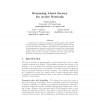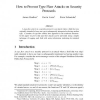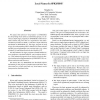CSFW
2000
IEEE
14 years 4 months ago
2000
IEEE
In this paper we develop a language of mobile agents called uPLAN for describing the capabilities of active (programmable) networks. We use a formal semantics for uPLAN to demonst...
CSFW
2000
IEEE
14 years 4 months ago
2000
IEEE
A type flaw attack on a security protocol is an attack where a field that was originally intended to have one type is subsequently interpreted as having another type. A number o...
CSFW
2000
IEEE
14 years 4 months ago
2000
IEEE
One protocol (called the primary protocol) is independent of other protocols (jointly called the secondary protocol) if the question whether the primary protocol achieves a securi...
CSFW
2000
IEEE
14 years 4 months ago
2000
IEEE
Some of the non interference properties studied in [4, 6, 18] for information flow analysis in computer systems, notably Æ , are reformulated here in a realtime setting. This is...
CSFW
2000
IEEE
14 years 4 months ago
2000
IEEE
We analyze the notion of “local names” in SPKI/SDSI. By interpreting local names as distributed groups, we develop a simple logic program for SPKI/SDSI’s linked localname sc...
CSFW
2000
IEEE
14 years 4 months ago
2000
IEEE
In this paper we present an improved logic for analysing authentication properties of cryptographic protocols, based on the SVO logic of Syverson and van Oorschot. Such logics are...
CSFW
2000
IEEE
14 years 4 months ago
2000
IEEE
ACSAC
2000
IEEE
14 years 4 months ago
2000
IEEE
This paper proposes a fair electronic gambling scheme for the Internet. The proposed scheme provides a unique link between payment and gambling outcome so that the winner can be e...
ACSAC
2000
IEEE
14 years 4 months ago
2000
IEEE
Security infrastructures are increasingly used in the health care and welfare sector, particularly for providing security, like confidentiality, authenticity, integrity, nonrepudi...
ACSAC
2000
IEEE
14 years 4 months ago
2000
IEEE
Viruses remain a significant threat to modern networked computer systems. Despite the best efforts of those who develop anti-virus systems, new viruses and new types of virus that...





